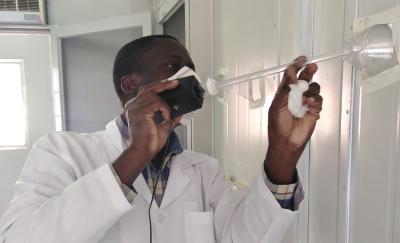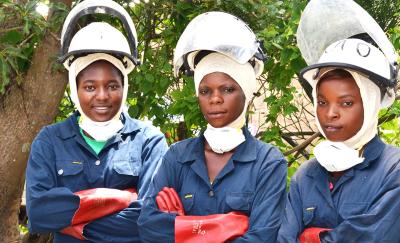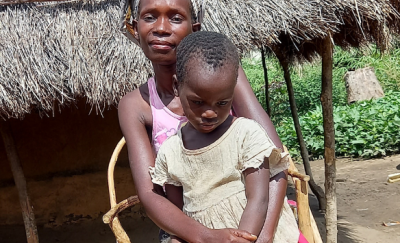Stop by our booth #608 on ASTMH 2024! Meet our global team members who are presenting our groundbreaking work in malaria vector control.
Abt is a leader in addressing malaria, tropical health, and infectious diseases, delivering sustainable health outcomes through an integrated, innovative, people-centered, and evidence-based approach. Our global efforts combat emerging threats like COVID-19, diseases such as influenza, tuberculosis, and AIDS, and vector-borne illnesses like malaria. We understand that these diseases jeopardize global health security, and we respond accordingly.
Since 2011, we have partnered with PMI and countries to protect millions from malaria in sub-Saharan Africa. Our expertise includes large-scale vector control such as the distribution of insecticide-treated nets and indoor residual spraying, entomological monitoring, and strengthening case management and malaria services for pregnant women. Operating in 22 countries, we implement proven, life-saving malaria vector control interventions aimed at reducing the overall burden of the disease. Through the U.S. President’s Malaria Initiative Evolving Vector Control to Fight Malaria Project (PMI Evolve), we enhance the capacity of ministries of health, national malaria programs, and research institutions to effectively plan and execute safe, cost-effective, and sustainable malaria control strategies.
The American Society of Tropical Medicine and Hygiene (ASTMH) Annual Meeting is the premier forum for the exchange of scientific advances in tropical medicine, global health, and hygiene. Abt Global is proud to be an exhibitor (Booth 608) as well as a presenter at scientific sessions and poster sessions. Stop by and meet our entomologists and vector control specialists! We’d love to tell you more about our work.
Abt Presentations
Thursday, November 14, 2024
Poster Session A | 12:00pm – 1:45pm
Poster Title: Assessing the 2023 School-based ITN Distribution in Kono District, Sierra Leone
Author: Keith Esch, PMI Evolve
Poster Title: Distribution of Anopheles vectors and their role in malaria transmission across high malaria burden areas in Malawi including Chikwawa, Karonga and Nkhata Bay districts
Author: Nellie Kaunde, PMI Evolve Malawi
Poster Title: Residual efficacy of wall contact bioassays and fumigants effects induced byActellic®300CS and Fludora®Fusion WP-SB 56.25 insecticidesused for Indoor Residual Sprayingagainst susceptible Anopheles gambiae s.s.
Author: Beatus Cyubahiro, Rwanda Biomedical Center/Malaria & Other Parasitic Diseases Division
Poster Title: Impact of focal malaria control using targeted indoor residual spraying (IRS), 4 years results from Rusizi District, Western Province of Rwanda
Author: Dunia Munyakanage, Rwanda Biomedical Center/Malaria & Other Parasitic Diseases Division
Friday, November 15, 2024
Scientific Session 73: Malaria Prevention | 10:15am – 12:00pm
Oral Presentation: Effectiveness of chlorfenapyr-pyrethroid insecticide-treated nets on decreasing malaria in Liberia: an observational analysis using routine health facility data, 2019 – 2023
Author: Emily Hilton, PMI Evolve
Poster Session B | 12:00pm – 1:45pm
Poster Title: Evaluation of Clothianidin Indoor Residual Spraying (IRS) and Piperonyl Butoxide (PBO) Insecticide-Treated Net (ITN) Co-Deployment Compared to PBO ITNs Only Using Health Management Information System Data in Sierra Leone, 2017-2023
Author: Emily Hilton, PMI Evolve
Poster Title: Impact of indoor residual spraying with SumiShield® 50WG on entomological drivers of transmission in Kigoma region Northwest Tanzania
Presenter: Aklilu Seyoum, PMI Evolve
Poster Title Localization in action: Transitioning indoor residual spraying management to host country government in Ankazoabo District, Atsimo Andrefana Region, Madagascar, 2023
Presenter: Hasina Jarinjaka Ramiandrisoa, National Malaria Control Program, Madagascar
Saturday, November 16, 2024
Poster Session C | 12:00pm – 1:45pm
Poster Title: An observational study evaluating the epidemiological and entomological impacts of piperonyl butoxide insecticide-treated nets compared to a combination of indoor residual spraying plus standard pyrethroid-only ITNs in Amhara Region, Ethiopia, 2019–2022
Author: Kelly Davis, PMI Evolve
Poster Title: Assessing the residual efficacy of pyriproxyfen-based larvicides for the control of the invasive malaria vector Anopheles stephensi in Ethiopia
Author: Getachew Bokore, Meshesha Balkew, PMI Evolve Ethiopia
Poster Title: The Impact of Interceptor G2 & PermaNet 3.0 Insecticidal Treated Nets on Entomological transmission indicators in Gaya & Guidimouni, Niger, West Africa
Author: Hadiza Soumaila, PMI Evolve Niger
Poster Title: Reduced susceptibility of Anopheles gambiae s.l. to chlorfenapyr and clothianidin could compromise malaria vector control efforts in Burkina Faso
Author: Roch K. Dabire, Institut de Recherche en sciences de la Santé, Burkina Faso
Poster Title: Entomological drivers of malaria transmission one year after IRS and three years after ITN distribution in Burkina Faso, West Africa|
Author: Dieudonne Soma, Institut de Recherche en sciences de la Santé, Burkina Faso
Poster Title: Human behavior determinants of exposure to malaria vectors Anopheles gambiae s.l. during dual active ingredients and PBO-based insecticide-treated nets use in Burkina Faso
Author: Aristide Hien, Institut de Recherche en sciences de la Santé, Burkina Faso
Poster Title: Measuring Receptivity in Malaria Foci in Cambodia Case-based Entomological Surveillance
Author: Sovannaroth Siv, National Center for Parasitology, Entomology, and Malaria Control, Cambodia
Scientific Session 142: Mosquitoes: Epidemiology and Vector Control 1 | 3:00pm – 4:45pm
Oral Presentation: Characterization of Larval Habitats to Assess the Feasibility of Larval Source Management as a Supplementary Intervention in a High Malaria Transmission Area in Nigeria and a Low Malaria Transmission Area of Zambia - Operationalizing the World Health Organization’s The Few, the Fixed, and the Findable
Author: Mohamed Bayou, PMI Evolve Zambia



